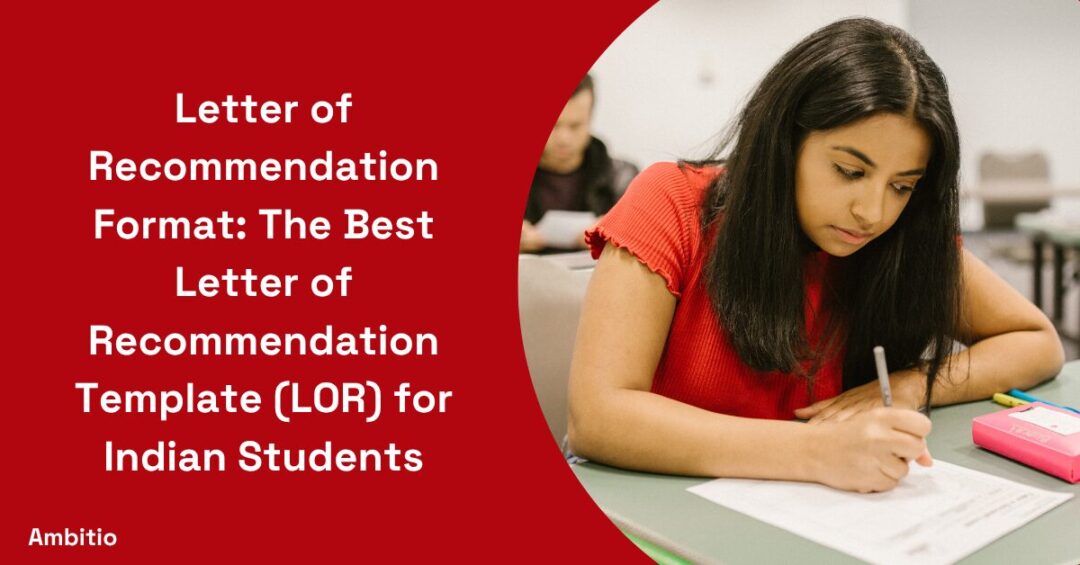14 August 2025
6 minutes read
How To Write A Letter Of Recommendation For A Friend?

Key Takeaways
- Learn how to write a letter of recommendation for a friend that feels personal, credible, and tailored to their goal.
- Start by stating your relationship clearly and include how long you’ve known the person.
- Use specific examples that prove their skills instead of vague compliments or generic praise.
More people trust a WhatsApp forward than a badly written recommendation letter. Brutal? Maybe. But when your friend’s future hinges on a piece of paper, you can’t afford to wing it. Writing a reference letter for a friend isn’t just about being kind—it’s about being clear, credible, and convincing. Most people either turn it into a bland character reference letter full of generic praise or overwrite it like they’re writing a movie script.
Neither works. If you truly want to endorse your friend, you need a personal reference letter that balances honesty with professionalism—one that highlights real qualifications, includes specific examples, and follows the business letter format. This blog gives you exactly that: no fluff, no clichés, just a solid game plan to write the letter that actually gets your friend noticed by the hiring manager.
What Is A Recommendation Letter?
A recommendation letter is a formal note written to vouch for someone’s character, skills, and work ethic. It’s typically used to support an applicant during job applications, college admissions, internships, or even housing rentals. Whether you’re asked to write a personal letter for a friend or a professional one for a colleague, the goal is always the same: to provide a strong letter of recommendation for graduate school admission

This letter is usually addressed with a salutation like “To Whom It May Concern” and should include your contact information for verification. But more than structure, what makes it truly impactful is the inclusion of concrete examples—moments where the person went above and beyond. It shows you’re not just name-dropping, but genuinely endorsing someone who deserves the opportunity.
How To Write A Letter Of Recommendation For A Friend?
A letter that starts with “I’m writing this to recommend my dear friend…” is the fastest way to ruin your friend’s shot at success. You’ve been asked to write a recommendation for a friend, not babysit their reputation. And yet, most people mess it up by using stiff language, outdated letter templates, or worse, AI-generated fluff. In today’s job market, a strong letter of recommendation can make or break someone’s chances—so writing your recommendation needs to be personal, precise, and persuasive.
If you’re going to write a letter of recommendation, let’s make sure it doesn’t sound like it was ripped from the back of a cereal box. Here are 6 powerful, non-generic steps that show you how to write an effective recommendation letter that actually helps your friend win.
1. Understand the Weight of Your Words
Before you write this letter of recommendation, ask yourself: “Would I endorse this candidate if my own job depended on it?” That’s the level of honesty the person reading the letter expects. If you’re writing a personal letter of recommendation, it’s not just about kindness—it’s about credibility. Make sure you know the person well enough to comment on their character traits, interpersonal skills, and fit for the job or specific opportunity they’re applying for.
2. Tailor Your Letter to the Opportunity
A good letter is never one-size-fits-all. Whether it’s a recommendation for a student or someone applying for a job, tailor your letter to match the job description or admission criteria. This means identifying which traits and skills are most relevant and showcasing them with concrete examples. Generic praise is useless. A personal recommendation only works when it feels custom-fit to the person and the opportunity.
3. Choose the Right Tone and Format
You’re not writing a poem. Stick to a professional letter of recommendation format. Use a readable font like Times New Roman, 11 or 12pt, and keep the letter to one page. Start with a clear salutation (“Dear [Hiring Manager or Admissions Officer],” or “To Whom It May Concern”), and structure the body of your letter into 3 parts: introduction, endorsement, and conclusion. Use the right letter templates or a clean reference letter template to stay on track.
4. Use Specific and Concrete Examples
Want to write a character reference letter that stands out? Ditch the vague stuff like “hardworking” and “team player.” Instead, provide concrete examples—like the time your friend organized a fundraising event that doubled donations, or led a team to finish a project ahead of schedule. Use specific examples to show—not tell—their interpersonal skills and ability to perform. That’s how you write a personal letter with real weight.
5. Express a Genuine Recommendation
Your personal recommendation letter should sound like you mean it without reservation. Phrases like “I am pleased to write this letter of recommendation for masters in computer science” or “I write this letter of recommendation without hesitation” send the right message. But don’t stop there—back up your words with action. Make it a persuasive letter that proves why the person you are recommending deserves this shot. If you’ve got strong stories, this is the time to use them.
6. End With a Clear, Open Offer
A strong close matters. Reaffirm your support, include your contact information, and say something like “Please feel free to reach out if you need more details” or “Please do not hesitate to get in touch.” This adds weight to your genuine recommendation and shows that you’re not just signing off—you’re standing behind your words.
5 Effective Tips To Write A Better Recommendation Letter For A Friend
Job seekers today aren’t just competing with others; they’re fighting through filters, bots, and burned-out hiring manager or admissions teams who scan a letter for 10 seconds max. If you’re going to help a friend, don’t waste that window with lazy praise and recycled lines. Writing a general letter with good intentions but no impact is like gifting someone an umbrella during a hurricane. Think, how would you write an LOR for yourself?
You want to write a persuasive letter that not only shows your relationship with the candidate but also gives real, measurable weight to their application for a job. Below are 5 raw, practical tips that show you how to write a letter to one person—and make it count.
1. Get Honest About Your Relationship (Seriously)
Skip the small talk. If your friend asked you to write a letter of recommendation, start by clearly stating your relationship to the applicant—were they your teammate, intern, flatmate, or someone you supervised? Mention how long you have known them and in what capacity. This simple clarity instantly makes your endorsement of the candidate more trustworthy. The stronger and more defined your relationship with the candidate, the stronger your voice in the letter.
2. Ditch the Adjectives, Show the Actions
Don’t just call them “responsible” or “hardworking”—use concrete examples that prove it. Did they pull off something challenging? Solve problems under pressure? Turn around a messy project? Then provide concrete examples that back that up. That’s how you elevate an application for a job from average to impressive. You’re not writing fiction; you’re making a case.
3. Don’t Try to Impress—Try to Help
Many people writing recommendation letters get caught up trying to sound overly professional or flowery. Drop the ego. If you want to help a friend, your job is to write a letter that lands with clarity, not complexity. Forget the buzzwords and jargon. Focus on the truth, the job market reality, and what truly makes your friend fit for the role they’re applying for. That’s the real gold.
4. Personalize It Like Their Career Depends On It (Because It Does)
Whether they’re applying for a job or grad school, you need to connect your letter to the actual opportunity. Find out what the job seekers are up against. Read the role or course description and map your friend’s strengths to that. Tailoring your message doesn’t just show effort—it shows you actually care about where this letter is going and why it matters.
5. Close With Commitment, Not Just Compliments
When you end the letter, don’t just say “best of luck.” That’s lazy. Wrap it up with a confident re-statement of your endorsement of the candidate and invite follow-up: “I’d be happy to speak further about [Name] if needed.” That’s how you shift from just writing a general letter to becoming someone who puts their word on the line—and that’s rare in today’s job market.
Conclusion
At the end of the day, writing a recommendation letter for a friend isn’t about sounding impressive—it’s about being useful. Think of it as a personal handshake between you and the hiring manager or admissions officer reading it. One that quietly says: “I know this person, and they’re worth your time.”
So be honest. Be specific. And don’t try too hard to make it perfect—try to make it real. A persuasive letter that’s grounded in truth and built on actual experience will always beat a polished, empty one. Because when you’re vouching for someone you care about, what matters most is that your voice rings true. That’s what gets remembered. That’s what opens doors.
Most students settle for boring, copy-paste LORs—but yours won’t. At Ambitio, our experts help you craft sharp, personalized letters of recommendation that actually say something—and make decision-makers pay attention. No templates, no fluff—just real impact, written right. Get your letter of recommendation done with Ambitio Elite.
FAQs
What is a letter of recommendation for a friend?
A letter that endorses your friend’s skills, character, and qualifications for a job, school, or opportunity.
How do I start a recommendation letter for a friend?
Begin with a formal greeting and introduce your relationship with the friend and the purpose of the letter.
What key points should I include?
Mention your friend’s strengths, achievements, skills, and specific examples demonstrating their qualities.
How long should the letter be?
Keep it concise—usually one page or about 3-4 short paragraphs.
Should I be honest if my friend has weaknesses?
Focus on strengths but be truthful; avoid exaggeration or false claims.
Can I use a casual tone since it’s for a friend?
Maintain a professional tone even if writing for a friend to ensure credibility.

You can study at top universities worldwide!
Get expert tips and tricks to get into top universities with a free expert session.
Book Your Free 30-Minute Session Now! Book a call now




























